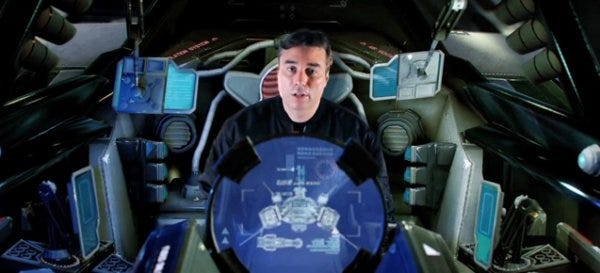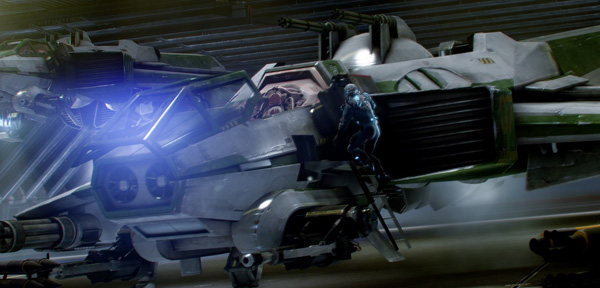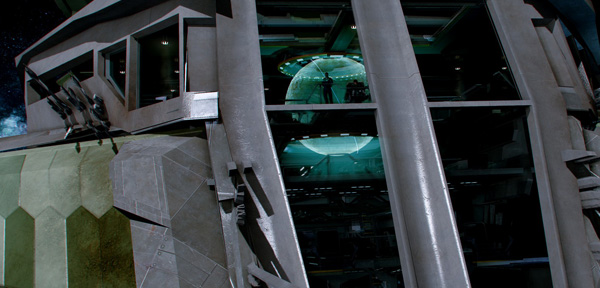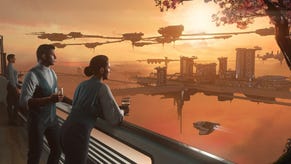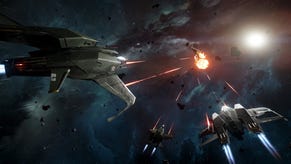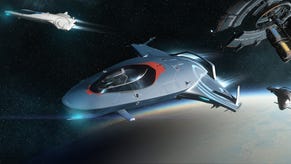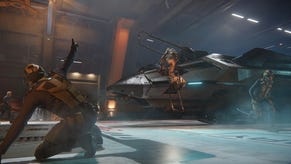Roberts On Star Citizen, Becoming A Space Crime Lord
Reaching For The Stars, Pt 1
During GDC Online, I find Chris Roberts situated in a plain white room - with little adorning it other than a conference table and Roberts' PC. Given the almost ridiculous grandiosity of his plans, the sparseness of the room makes for something of an odd contrast. But soon, all of that fades into the background. Roberts runs me through a surprisingly polished demo of Star Citizen in its current state, and it's hard not to let my imagination get away from me. The foundation's clearly in place, and the possibilities seem endless. But this is still a game. There have to be limits. Moreover, where's the line between pie-in-the-stars ambition and reality? So naturally, I ask. I ask about EVERYTHING. In part one, we cover why the universe is broken up into instances, Squadron 42, why Roberts doesn't think this will become some crazy political struggle ala EVE Online, and of course, Roberts' aspirations to a life of space crime.
RPS: Your plans for the scale of this game are positively insane, but how does it all actually work? What happens if I, say, die in combat? What's the penalty?
Roberts: Here’s the thing. I’m actually bummed by the current design philosophy, where there’s no penalty for doing not particularly well. A lot of games I play, console games, I don’t play very smart because I know that when I respawn, I’m a second away. I just go in guns blazing and bully my way through the story. I really like Demon’s Souls. I completed it and almost finished a second playthrough. I don’t usually put that kind of time into playing a game, but it was like 200-plus hours of being obsessed for two or three weeks straight. One of the things I liked about it was there were real consequences. The good thing about that was that when I achieved something, I really felt like I’d achieved something. It wasn’t easy. It was a combination of the most frustrating and the most rewarding game I’ve played in a long time.
In this, I don’t think we’re going to be quite as tough as Demon’s Souls, but there needs to be some penalty. You can’t just blast away and then respawn and go back. If you go out in space and your ship gets destroyed, you’ve lost your ship. We’re basically trying to do a lot of things like the real world. We’re trying to simulate an economy. You can buy ship insurance just like you could buy car insurance in the real world. You can buy cargo insurance. If you’re smart, you’ll pay a bit of money for insurance, because… With insurance, if you get blasted, you’ll lose your cargo, you’ll end up on the same planet again in a replacement ship. If you don’t have insurance you’re going to lose it all. You can take that risk, but it shouldn’t be the idea that you just go out there and get blasted and just instantly respawn with a ship. There needs to be a consequence.
For instance, if you’re someone operating on the outer edge of the galaxy, it’s just like if you’re living in a really bad neighborhood. Your insurance is gonna cost more than your insurance costs in the center of the galaxy, where it’s pretty safe. If you’re in the center of the galaxy and there’s a lot of military and law enforcement around, it’s safe. There’s not going to be a lot of PvP stuff, or people jumping newbies and stuff like that. Like out here [motions at, er, existence], I couldn’t just start taking stuff from people in the street. The police would stop me. But of course, when you’re landing on Earth and you’re selling goods, you pay tariffs and taxes. Someone’s got to pay for the infrastructure. Someone’s got to pay for the police force.
On the other hand, on the outer edges of the empire where there isn’t really law and order, you don’t have landing taxes or anything. But you also don’t have any protection from police or the military. So again, the concept is that it’s like the real world. You make your choices – where you want to be, how you want to play. If you want to be on the other side of the law, a player-killer, you can be. But there will be areas of space that you’ll want to exist in, because if you try to do that right nearby Earth where the strongest part of the empire is, you won’t last very long.
You can definitely attack people, it’s just that suddenly you’ll be on the most wanted list and every bounty hunter in the galaxy will be zeroing in on you. The times you can shoot people down inside those areas of law and order is when they’re on the most wanted list, so to speak. The idea would be that the systems that you build inside this universe kind of help regulate the world, just like in the real world. That’s one of the concepts. We don’t have it running yet, so who knows?
A lot of games, like even EVE Online, they do some things that happen in the real world, but they never do everything. I think if you’re going to do it, you should simulate it properly, because that’s the reason why the world works the way it does. You can have law and order, but you need taxes to pay for it. It needs to be done that way, rather than just be an arbitrary system. That’s one of the core ideas, because I think that if you simulate it to that level and you make it fun and interesting, then in some ways, I want the community [to create the rest].
I want some people to be the arch-criminal overlords that operate beyond the reach of the law in some asteroid field off in the rim. They have an underground network paying people to do hits. I want someone who’s a big merchant prince that’s trading a bunch of stuff and hiring other people to do runs. You should be able to have all those roles happening in your galaxy if you set it up right. Players gravitate to different things. Someone wants to be a bounty hunter. Someone wants to be an explorer. Someone wants to be a criminal overlord. You should be able to do all those things. It’s pretty cool, especially if you allow the players to hire out and do stuff with each other. It’s not just the game hiring you. You can get paid missions from the game, but players themselves should be able to essentially do Craigslist listings inside. “I need a couple of tough mercenaries to fly on my wing, because I have to deliver this cargo over here and it’s pretty hairy.” If you put all that together in an open-world setting, it’d be pretty awesome.
RPS: That’s tremendously ambitious. It’s one of the more ambitious things I’ve heard for, um, games. Ever.
Roberts: Well, nobody ever accused me of not being ambitious.
RPS: Richard, who saw Star Citizen for us before you revealed it, was concerned that Squadron 42 seemed fairly inessential. He was worried that all this ambition would necessitate that you leave a few things on the chopping block, and a single-player component seemed like a pretty easy target.
Roberts: Yeah, but the way we’re structured, that probably won’t happen. The Squadron 42 element of it is in the content development plan at an earlier stage than the full Citizen universe. It’s scaled the way it is because the functionality I need for that is a subset of the functionality I need for the bigger universe. The space combat, flying around, the multiplayer side, all that. That’s the core functionality that will also go into Star Citizen. What Star Citizen puts on top of it is the persistent universe. It’s a meta-level.
The way I would view it is, think of Squadron 42 like World of Tanks or something like that. You can jump into battles and we have a single-player narrative. That level of stuff where it’s not necessarily persistent. Then the Star Citizen side is the persistent layer on top of that, making everything that’s happening make sense in a holistic universe. It’s a bit easier in a space setting, something like a Freelancer/Privateer setup, than if you were trying to do a World of Warcraft or a Rift or something like that.
The stuff that happens in the big universe, the persistent universe, on that level you don’t need that side of it to be so high-fidelity in real time. The realtime stuff is just flying around in space and the combat. The persistent universe, what it’s doing is the matchmaking. The persistent universe keeps track of where you are in the galaxy, how much money you’ve got, what ship you’ve got, which isn’t necessarily a realtime thing. If we wanted to, the persistent universe could be completely handled by a sort of boring web interface, but obviously that’s not the style of thing I like to do.
So the persistent universe side, what it does it the matchmaking. It’s figuring, okay, you’re flying from planet A to planet B. Ben over here is flying from planet C to planet D. You two are going to intersect. He’s a pirate and you’re a merchant, so you’re in conflict. It creates an instance, which is dynamic and isn’t permanent, and puts you into it to resolve your conflict. It will allow other players to drop into it. You’ll have slots saved so that if you have friends and you’re under attack, you can send out to your friends and say, “Hey, I’m under attack! Anyone close by, come help me out!” They see that message pop up when they’re flying around and they can hit it.
RPS: So you're going to put all of that stuff on top of Squadron 42, then?
Roberts: My point is that the Squadron 42 world, the battle instance itself and all that, that is all Squadron 42. That’s all the same stuff. What Squadron 42 doesn’t have is the persistent database side. I guess what I’m trying to say is that the single-player is safe. First of all, because the Wing Commander side is very important to me. But second of all, it’s a subset of the bigger thing.
If someone was going to say, “Chris, can you get this all done?”, the question isn’t so much about getting the Squadron 42 stuff done. It’s more about getting the full big vision of the world going. That’s the biggest challenge. So the only thing I’ll say in counter to that is that I’ve built that open world a couple of times. I’ve spent a lot of time thinking about how to structure the persistent world and have the advantages that you get from building that kind of world in space. There’s a reason why EVE Online lets everyone be on the same server. They can’t do that in World of Warcraft. It’s the same reason I can do it in this one. As I was explaining, the persistent universe side of it is really just a matchmaking service and a stat-tracking service. It’s just dressed up in a way that makes it feel like it’s part of the world. We don’t ever worry about, “Okay, everyone in our universe can go to this specific point at the same time,” because it’s not set up to be that way. You could all say, “Let’s go to Earth” at a particular time, but when you’re on Earth, it’s not on a realtime basis. It’s just like being in a big chatroom that’s dressed up with some nice graphics.
RPS: What is the biggest group size that can be in a single spot? Is that decided by how many people can be in combat at once?
Roberts: Yeah. The biggest group that can be at one spot in space is decided by how many we can have in combat at once. It’s not fully determined. It’s going to be somewhere between 60 and 100-some people. Freelancer could manage about 128 people online, so I’m hoping we can do that. We have a high degree of fidelity, but then also the broadband is much better than it used to be. If you look at Battlefield on the PC, it can do I think 64 players at once in an instance. It’s going to be somewhere in there. We have the advantage over Battlefield, because they have to have the whole environment rendered. Most of this is in space, so you don’t have to worry about the background crumbling. What would happen is if, say, there’s 10,000 people in orbit around Earth, there would be 100 different instances of 100 people, basically, in orbit.
RPS: Say in your crime lord scenario from earlier, someone put out a hit on somebody. How would the person trying to carry out the hit navigate to the instance where the target is?
Roberts: Here’s the thing: We can have 10,000 people down on the same planet. It’s not that you would have 10,000 people sitting in the space bar, but the system knows that you’re on the planet. We do this dynamic matchmaking I’m talking about. If, for instance, you had a hit out on someone, and you took that job, the persistent universe server knows, “Okay, you’ve been hired to take Ben out over here.” It knows that and it’ll match you. Tagging Ben and you together. Unless you’re getting a job to take out 200 people all at the same time. We’re not going to let you do that.
Essentially what it does is, it matchmakes you with your friends. It knows who your friends list is, and it’s always trying to put you together. It also knows, if you’ve got missions against someone that’s a player, that it should try to put you together as well. It’s trying to dynamically match you up with people who are in opposition to you, too. It’s like a very sophisticated matchmaking service.
On the surface of it, as a player, it seems like you’re part of this massive universe and people you’re looking for just happen to show up. But there will never be a case like in EVE Online where you can have a thousand players show up for a massive stellar war. It’s not meant to be that way. It’s a different level of scope. It’s why it’s called Star Citizen, and not Earth and Empire or something. It’s about the individual point of view - not the overall political campaign or corporations or whatever.
RPS: OK, so say again that someone has a hit out on them, and that develops into a massive battle, and that fills up the instance. If someone else were also to want to join into that, what would happen? Would they just get a, “Sorry, you can’t join, this queue is full” message?
Roberts: The goal, hopefully, is not to be in that situation. The idea would be that we reserve slots for players to have their friends. I’m sure there will be some cases, because you can’t reserve five slots for every player in it, that there'll be too many. What will probably happen is, if we can fit 100 people in one battle instance, we may allow 50 to 60 and then keep 40 slots open, thinking that will be plenty of slots for friends to join. There could be a case where all these people call their friends and 100 people could want to turn up, and then in that case that would be a problem.
But the goal is, in most cases… I don’t know if you realize when you fly, but the airlines all overbook their flights, because they know that 10 percent of people don’t show up. If they have 110 people on the plane, they’ll take 120 bookings for it, because most of the time they’ll be fine. That’s why you’ll occasionally show up and they’ll say, “Does anyone want to take a later flight?” You always have to do this trade-off of trying to have as many people in the battle instance so it’s cool, but also reserving enough slots so people can show up.
There will, I’m sure, be some instances that will break it where everyone who shows up has a lot of friends who can all come in. At that point, we’ll figure out a way to try and be as elegant about it as possible. That’s the one use case where I can see it breaking. We’re trying to do everything we can to make it, for most of the time, so that won’t happen. Most of the time, your experience should be, “You’re under attack, send out a distress call, you’ve got friends nearby, they show up.”
RPS: What kind of civilization do you hope players will ultimately create? EVE is known for all its corporations and its political dealings and things like that, but you're obviously designing something very different.
Roberts: Well, if you think of World of Warcraft, it’s not really 2,000 people getting together to go off and figure out how to do something. It’s you and your group of buddies going on a dungeon run. I want it to be more on that level, where you’ve got three, four, five, six friends that you go and fly around in space with. You don’t have to, but you can work together to do trading runs and split the profits up. I view it as encouraging a group dynamic, but it’s a smaller group dynamic than EVE Online. I’m focusing more on half a dozen people or less. Not hundreds of thousands of people.
As far as the big meta-corporations, I could be wrong. There may be a situation where someone really works the system well and has hundreds of people working for them around the galaxy. But that will probably be more in a case of… they’re the ones issuing missions and putting them on boards. Their effects are felt through the galaxy, but there’s never a point where all their stuff happens in one moment. I think that would be cool, but I think that it’s not really set up for you to build up your corporation or group of followers to 2,000, 3,000 people. I could be wrong, but I think the missions and the action we’ll see will be on a smaller scale. They’ll be on a more personal scale.
RPS: You've been pretty adamant about planning for very consistent, frequent post-launch updates. But I got the impression that you meant that from the standpoint of everything - from new content to balancing and tweaks and stuff like that. How many people do you have working on this, and how many are you planning to have work on it in the long run?
Roberts: The group that put together the tech base and did all the research was less than 10 people. We’re going to ramp up to a much bigger group of people. I don’t want to have a ridiculous group of 300 or 400 people, but the core group will be about 40 or 50 developers, and then it will scale on the content side outside of that. Building content with this level of fidelity takes a lot of time. It’s much more complicated. You look at a fighter flying around, you see all the bits move. All the thrusters are articulating. When I’m moving my guns around, you can see all the wires. The missile bays. You can see my head there. The guns behind there are all tracking. There’s a huge amount of engineering that goes into it. It’s not just designing something that looks cool. You have to design something that works. You can fit inside the cockpit when you climb in. You have to figure out those ergonomics. The thrusters all have to balance where they’re put, because they’re actually generating force.
Obviously you don’t need wings in space, there is that, but the simulation of this and how it flies is 100 percent correct to how you would fly it around in space, the same way the lunar lander or whatever works. There’s a lot of work that goes into this. The way we’ve worked out a workflow is that you have the core team handling the programming and art integration and coordinating, but a lot of the assets are done in a scalable basis like you would for a film or something. At the height of it, we would probably have several hundred people working on all the assets, but you scale up and scale down as you need to.
Part of the concept is that we’re going to go live and it’s not all the content that we’ll want to have eventually. We’ll be bringing content online all the time. Not just once a year or anything like that. My theory is that’s going to make the universe feel more real. When we’re adding content we can be reacting to what’s happening. I gave you that scenario where someone could be playing the crime lord and hiring people to do nefarious stuff like hits on people. Running the game, we would see that, and we could start to… I mean, just little things. We’ll have news blasts about what’s happening in the galaxy. If you’re down at the bar, you can read about what’s happening. There will be reports of raids on a planet… “There seems to be something happening over here.” All that stuff, we want to feed back into it. When you’re in this universe, you feel like it’s alive and things other players are doing are becoming part of the fiction of the universe.
RPS: Right, you’re planning to turn player interactions into the lore of the universe. Another example you cited was, if someone discovers a new navigation route, it’s named after them. Do you have any other ideas for how you want to do that?
Roberts: The jump point’s probably the best example, because it’s a simple one to illustrate. Things like in today’s world, if you make a bunch of money, you can build a building and get your name on it. You go someplace and it’s the “whoever” building, that’s just someone who made a lot of money a long time ago and could buy a building and put their name on it. That’s a pretty simple illustration, but the later-stage stuff, when you’ve accumulated enough wealth, there is real estate you can buy in the game, on planets and such. That’s another example of the players becoming part of the lore.
We are actively going to update the galactic news briefs based on what’s happening with the players. We’re trying to find interesting events and use that as a source. We’ll have some NPC stuff to talk about, but part of the agenda is also to refer to things that are happening as the game’s operators see them. If there was a battle or a conflict or whatever, we’re trying to have that come across in the news items. You don’t have to do it all the time, but if you have this happen occasionally, it sells people. They see themselves there and think, “Wow, that’s cool. I’m notorious. I’m wanted in five systems!” That’s the kind of thing that should happen. If someone’s taking people out, they should be on the most-wanted list. It’ll be on the news briefs, the face is up on the Galacticolor vids and stuff. What you need to feel is like your actions have some impact on the world and other people can see that.
Check back tomorrow for part two, in which we discuss the story behind Star Citizen's world, progression systems, flight sticks, crowdfunding, the modern state of PC gaming, and - most importantly - whether or not Roberts plans to ever actually visit space himself.
